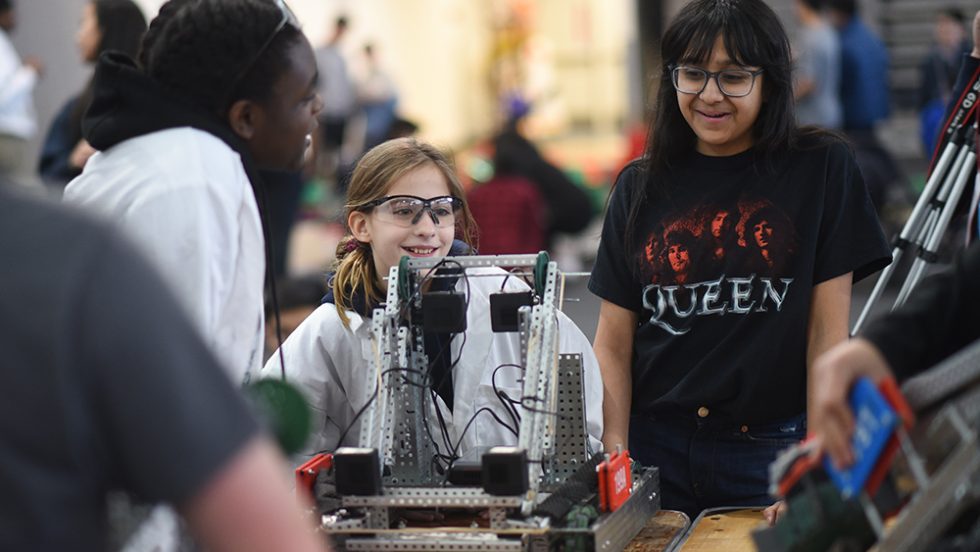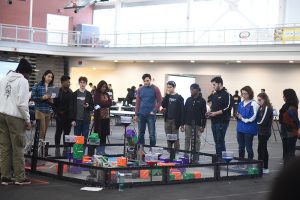
Students in Adelphi's STEP and CSTEP programs from underrepresented communities and low-income households get early experience in science and STEM studies.
The members of Wisdom Lane Middle School’s robotics team were proud to participate in the VEX Robotics Competition held January 18 on Adelphi’s campus. But beyond that, they said, they were overjoyed with the support they received and the teamwork they experienced, not just within their team but among teams as well.
“I honestly love driving [their school’s robot], but also the teams are supportive of each other,” said eighth-grader Nicole Morales. “We’re always just also screaming in the crowd, ‘Go, team!’ You want a fair fight with everybody, and everybody to perform at their best.”
“It’s not like a competition where you knock your opponents down. You’re building them up,” added Wisdom Lane coach David Loveland.
Wisdom Hill didn’t end up winning any of the six awards handed out at the event, but the lessons learned in mechanics and sportsmanship are the real prizes in the annual match.
About 400 people—including participants, judges, family members and volunteers—were on hand for the Saturday afternoon event, in which middle and high school students follow a challenge from the VEX Robotics design firm and compete against other school teams in robot showdowns. The event reinforces STEM concept learning as well as building teamwork, leadership and communication. But for the most part, it’s just exciting. Parents, family members and other participants stood and watched throughout each match. The mood wasn’t one of aggression or conflict, but of cheers in support and appreciation for the displays of hard work.
Early science education initiatives on the rise at Adelphi
 This was the seventh year of the VEX Robotics Competition at Adelphi, one of several such events Sabita Nayak, Science Advancement Programs project director, has brought to Adelphi. Plans are underway for a drone competition for middle and high school students from across the state and other new programs to be hosted on campus.
This was the seventh year of the VEX Robotics Competition at Adelphi, one of several such events Sabita Nayak, Science Advancement Programs project director, has brought to Adelphi. Plans are underway for a drone competition for middle and high school students from across the state and other new programs to be hosted on campus.
The hard work has not gone without notice. Last year, Nayak and the program received the President’s Award from the Association of Program Administrators for CSTEP and STEP for “extraordinary dedication and service,” and the New York State Office of Higher Education noted, in a follow-up to a site visit, that Nayak and her staff “should be commended for their outstanding professionalism and continued hard work to keep such an effective and efficient program running flawlessly.” And the New York State Education Department recently renewed the program’s funding with a five-year grant of over $5 million.
Nayak hopes to expand the effort to include more schools, but to do so will require more grants for teacher training. A new grant to fund two additional staff positions starting in the fall, however, will help Nayak build the program, and also build Adelphi’s statewide reputation in the sciences.
“This program—how it’s committed to the community—brings Adelphi to a high level,” she said. “All of these things are just a part of [how the] Adelphi STEP Program is working to meet the need for STEM careers.”
Adelphi’s School Science Advancement program is part of the University’s STEP (Science and Technology Entry Program) and CSTEP (Collegiate Science and Technology Entry Program) initiatives. STEP and CSTEP provide academic enrichment in science and mathematics for seventh- to 12th-grade students through classes, workshops, conferences and mentoring programs. The mission of the programs is to support and inspire all students from underrepresented backgrounds to enter science, technology, engineering and mathematics (STEM) careers through collaboration with Long Island school districts.
Science education is a passion
This year, about 200 students were enrolled in Adelphi’s CSTEP program and about 400 were enrolled in the STEP program—all of them from underrepresented communities such as African American, Latino and Native American or from low-income households—and all of them being introduced to concepts and possible careers in science and engineering. Nayak doesn’t take the responsibility lightly.
“I do it from my heart,” she said. “It’s my passion. I love to make a difference.”
Nayak remembers a student from a single-parent home in a disadvantaged neighborhood who participated in the early years of the competition.
“After coming to this program, he changed,” she said. “Last year, he went to the University at Buffalo. This program changed that child.”